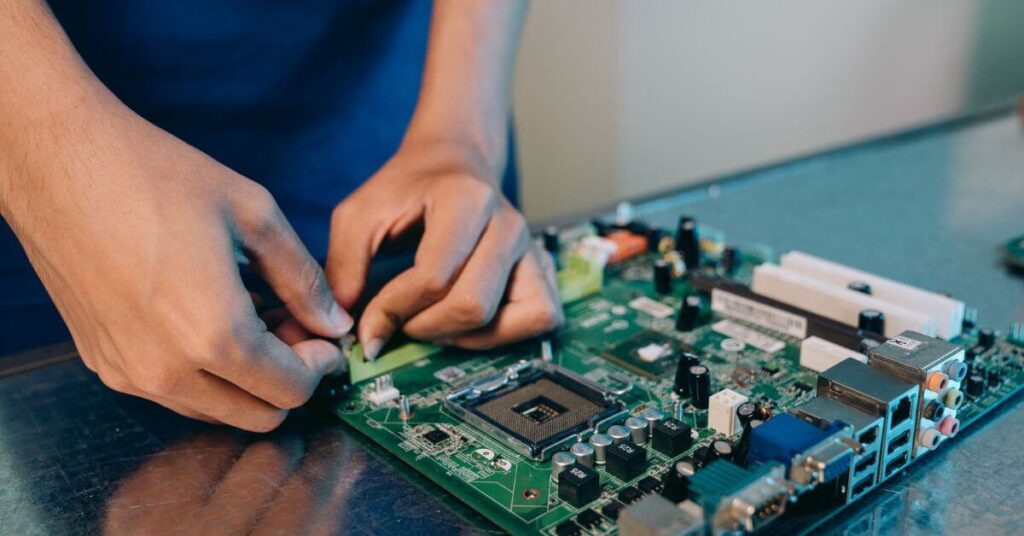Is Motherboard Matter for Gaming – When choosing gaming computer parts, they should work together in harmony to create a fluid and vibrant experience. Every piece of construction matters to some extent, even the power supply and hard drives can improve your experience if selected carefully.
So, of course, the motherboard is important for gaming, but the reasons why it’s essential may be a little different than what you expect.
There are three things that make a motherboard important when building a gaming computer: quality, compatibility, and overclocking support can make a big difference in a gaming rig. However, it is not the most important thing on your computer when it comes to performance.
The CPU, GPU, and RAM will probably affect your gaming performance more than the motherboard . However, the motherboard is what connects each of these components and allows them to function as one. You don’t want to buy the most basic one you can find without considering whether it will be compatible and stable.
Table of Contents
What types of motherboards will work?
There are many different motherboards with different designations. For example, it’s not uncommon to see a board that says it’s made explicitly with players’ needs in mind .
You don’t have to buy a gaming-focused board. Instead, you should look at each of the specifications to see what it offers and which parts it will work best with . A non-gaming board may save you money and provide the same performance as a gaming board.
This does not mean that all motherboards are the same and work the same. They are not and will not be. Depending on how you like to game, there are definitely some features you may want in a gaming motherboard.
Does Motherboard important for gaming?
Your motherboard is important for gaming because it is the foundation for the rest of your build. Its importance lies in its compatibility with other parts, but there are other aspects to take into account when purchasing a new motherboard.
Quality and Stability
Some motherboards are simply better built than others. These quality updates can offer you more stability. Here are some things to look for that could affect your experience with your motherboard.
- The PCB layer on the board may affect its stability. Often, boards constructed with more layers are higher quality boards, but they tend to cost more.
- Check what type of ports are on the back of the motherboard. Make sure it has all the connections you may need.
- Some boards may advertise higher quality materials. Some of these may help mitigate heat better than other options.
One way to find a high-quality board is to check out lots of reviews and comparisons, especially those made by professionals with a reputation you trust . When comparing multiple boards to each other, you can hear where each one stands out. Look for options that promote better temperatures, better power regulation, and faster ports.
CO Support
If you plan to overclock your CPU and don’t have experience doing it yourself, a motherboard designed specifically to support overclocking could be a reasonable investment. Overclocking can be difficult and some boards make it much more manageable.
Boards designed for overclocking also typically have higher build quality due to the higher expected system demands. They also come with software that can help you overclock . You’ll notice that many boards that offer this type of support are aimed at gamers.
Peripheral Support
The most important feature of your motherboard is what peripheral devices it can support. For example, you don’t want to choose a motherboard that won’t work with your intended CPU, GPU, or RAM . Here are some things that matter when choosing a gaming motherboard.
- Consider what type of RAM it can handle. Dual channel RAM or quad channel RAM is a must for gaming computers.
- Make sure it is compatible with your CPU. It needs to have exact compatibility, or it won’t work.
- Check what type of drives you can connect. Most newer motherboards come with an M.2 slot which has speed advantages over other drive types.
Always make sure your motherboard has the ports and slots you need. Compare the boards to each other to get an idea of the standard for each port compared to how many you might need, especially if you’re building a high-end gaming build.
Special features
Some other features that some motherboards offer may attract a gamer enough to influence which board they choose to purchase. Keep these features in mind when purchasing a new motherboard.
- Some motherboards are also designed to help speed up RAM.
- Look for a motherboard with visible error codes if you want to overclock and troubleshoot your build.
- Some motherboards offer a dual BIOS setup. If one fails, you can still use the other.
- Many motherboards designed for gaming are upgraded for stable power regulation. Anything that helps the board run smoothly will be good for gamers.
- Motherboards with integrated Bluetooth and Wi-Fi are also available.
When you look at a motherboard’s spec list, you can see how it compares to another board.
What features should I look for in a good gaming motherboard?
The most important feature of a gaming motherboard is its compatibility with your CPU, GPU, and RAM. Beyond that, there are some features you may want to look for.
- Consider getting the upgraded drives, especially if you use your computer a lot. While M.2 drives have less storage, they are great for running the programs you use most. When it comes to gaming, it’s worth improving to reduce any delay between the action on the screen and your eye.
- Look for motherboards that support high-speed RAM. Improved RAM can help your game run smoothly. You should also make sure you buy a motherboard that supports your type of RAM. While DDR 5 is the newest and very fast, DDR4 is still a solid option for gaming.
- Try to find motherboards that offer some type of cooling solution. Boards with larger heatsinks or other integrated cooling options may hold up better in the long run.
How do I know if my motherboard is good for gaming?
Check out the recommended specifications for the games you want to play. Focus on the CPU and graphics card. If your motherboard is good enough to support the corresponding components, then it is good enough for gaming. That’s what matters most.
However, if you want any of the specific build features mentioned above, you need to narrow down your options. For example, choosing a board with DDR 5 may mean that you can’t select a different board that supports DDR4 but also has a cooling option that you like.
What if the motherboard I have is not for gaming but works fine?
If your motherboard works and does not create any problems or prevent your other parts from working at their best, then your motherboard is good for gaming. You don’t need to change to another motherboard unless the current one has some kind of problem or you need to upgrade it for compatibility reasons .
Frequent questions
Do motherboards affect FPS?
Unless a new motherboard allows another peripheral part to work more efficiently and deliver more performance, it won’t affect your FPS. The motherboard alone has no influence on your gaming performance .
Do I need an expensive motherboard?
You don’t need an expensive motherboard to play games. In fact, motherboards are one of those areas where people will go a little cheaper on a build to put the money elsewhere . While you need to get a compatible motherboard and it’s best to opt for a higher quality one with more features if possible, you won’t have a horrible computer if you opt for a cheap motherboard.
Should I upgrade the motherboard or CPU first?
If you have a choice, upgrade the CPU first. Just remember that your CPU has to be compatible with your motherboard. Upgrading your CPU won’t improve the upgradeability of your entire machine, it will just make programs run better. Upgrading your motherboard may not give you equivalent performance improvements, but it will give you the option to upgrade your entire build in the future .
Will I notice the upgrade if I get a new motherboard?
You won’t necessarily notice a significant improvement in your gaming if you upgrade to a new motherboard. That’s one of the reasons I don’t recommend doing it unless you need a new motherboard or are having problems with your current one.
You may find that if your current motherboard is very outdated, you may notice the upgrade a little more. However, the motherboard is the foundation of your system but not the heavy hitter in it . You’ll notice an upgrade to almost any active peripheral more than one for the motherboard.

Pradeep Sharma is a author the mind behind Techjustify, where I craft insightful blogs on technology, digital tools, gaming, AI, and beyond. With years of experience in digital marketing and a passion for tech innovation, I aim to simplify complex topics for readers worldwide.
My mission is to empower individuals with practical knowledge and up-to-date insights, helping them make informed decisions in the ever-evolving digital landscape.


